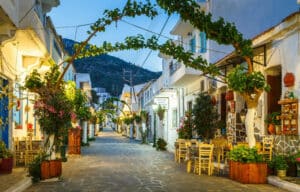In The Ikaria Way, Greek American chef Diane Kochilas offers a roadmap for people who want to incorporate aspects of the Mediterranean island’s “Blue Zone” diet into their lives.

As one of the world’s five designated “Blue Zones”, Ikaria, a small Greek island in the eastern Aegean, has lower rates of chronic disease than most other places, and its more than 8,000 full-time residents have some of the longest life expectancies in the world.
In fact, one-third of Ikarians live past 90 years of age, and factors such as strong social and family ties, exercise that is integrated into daily life and frequent napping are thought to be why these island inhabitants often live to be centenarians.
Another important contributing factor is what they eat.
Like the Mediterranean diet, the Ikarian diet includes healthy fats, a lot of fibre and nutrient-rich whole foods. It’s highly plant-based, featuring nuts, grains, potatoes, legumes, vegetables and seeds, and olive oil is the main source of added fat.
Yogurt and cheese, fish, poultry and red wine are consumed in moderation, while red meat is limited to just a few times per month. Eating this way has been shown to lower risk factors for health conditions such as heart disease, stroke, diabetes, high cholesterol, obesity and high blood pressure.
In her new cookbook, The Ikaria Way (available on 26 March), Greek American chef Diane Kochilas offers a “roadmap” for people who want to incorporate aspects of the Mediterranean diet, inspired by how residents eat on Ikaria, into their lives.
For her, the book focuses on two issues: how to be good to your body “without being mean to your mind”, and how to cook “in the spirit of a relaxed, healing kind of island where the tempo of life is slow and easy and where people connect through food around a table”.
It highlights dishes for light meals, snacks, dinners for larger groups and everything in between, with recipes such as yogurt cucumber soup with walnuts; grilled peaches and rocket salad with feta; spicy fava beans braised in red wine; and orzo pilaf with pistachios and currants, among many others.
“I think that one of the things that always surprises me is just the level of stress that people accept,” she says. “In the US, stress is so detrimental, and most of it is in our own heads and thought patterns.” The Ikaria Way aims to help people become more mindful in how they take care of themselves, and Kochilas wants to show them how “food is also love”.
In addition to authoring several other cookbooks and hosting the PBS cooking show My Greek Table, Kochilas runs a cooking school on Ikaria, where her family is originally from and where she lives for half of the year. It was during one of her weeklong classes that she got the inspiration for the 100 plant-based recipes that she includes in her new cookbook. She writes, “I had two guests from Montana who stood in bewilderment at the kitchen counter on the third day of the class and confessed that they not only ate meat three times a day back home, but they also never imagined that plant-based cooking, which is mostly – but not all of – what we do during our week together on the island, could be so satisfying, varied and real.”
Vegetarian foods found on Ikaria are not only healthy and filling, but also practical. For one thing, on the island, as in other parts of Greece, some people still follow the Greek Orthodox Church’s fasting calendar and, therefore, they do not eat meat at certain times of the year, such as during Lent. The ingredients found in Kochilas’ cookbook are also bountiful on Ikaria – including yogurt, dried fruits, honey, sea salt, olive oil, nuts, fresh herbs, grains, garlic and a variety of legumes – but she notes that similar products should be available at most supermarkets.
Beans feature prominently in The Ikaria Way and Kochilas makes them the protagonist in dishes such as lemony fresh fava beans with artichokes, tahini and yogurt; dried fava stew; red beans with hot pepper flakes and fresh herbs; and caramelized giant beans with turmeric, fennel and romaine, just to name a few.
According to Kochilas, “Bean consumption helps heart health by lowering cholesterol because beans are rich in soluble fibre, which attaches to cholesterol particles and flushes them out of the body.” She also says that they are “palliative when it comes to managing and even preventing Type 2 diabetes”. She writes how “eat beans and live longer” has become a mantra for proponents of eating the way people do in a Blue Zone, a phrase originally coined by National Geographic fellow and longevity expert Dan Buettner, who asserts that “eating a cup of beans each day can prolong a person’s life by four years”.
Kochilas also offers many recipes for beans in the book since they are versatile – as they can be used in soups, salads or main dishes – and people can “find good beans anywhere”, she states.
Of her recipe for white bean stew with aubergine, tomato and feta, Kochilas writes that “this simple dish is one of many ways we combine beans and pulses with vegetables in the Greek kitchen.” A home cook can use canned beans for the recipe, which should provide a filling, nutritious and balanced meal for those who choose to make it.
Kali orexi is how Greeks wish each other bon appétit, and perhaps this phrase will also become part of diners’ vernaculars when they make this recipe as well as others that Kochilas provides in The Ikaria Way.
White Bean Stew with Eggplant, Tomato & Feta recipe – By Diane Kochilas
Beans are one of the healthiest plant-based foods in the world and a seminal ingredient in the Ikaria longevity diet. I only recently joined the canned bean bandwagon because it never seemed like too much trouble to me to soak my beans overnight and then just boil them for whatever recipe I was preparing. But I understand the desire for convenience, and there are certainly plenty of great canned beans. Look for organic and low sodium if possible.
Makes 4 servings
Ingredients:
- 4 tbsp extra-virgin Greek olive oil, or more as
needed - 1 medium red onion, chopped
- 2 celery stalks, chopped
- Greek sea salt to taste
- 2 garlic cloves, finely chopped
- 2 medium aubergines (eggplant), trimmed and cut into 1-in (2½-
cm) cubes - freshly ground black pepper to taste
- 2 cups plum tomatoes, drained and chopped
- 2 (15-oz/425g) cans good quality cannellini beans, rinsed and drained
- 1 tsp dried Greek oregano
- 2 tbsp chopped fresh flat-leaf parsley
- 2 tbsp crumbled Greek feta or coarsely grated cashew-milk cheddar
Method:
Step 1: Heat 2 tbsp of olive oil in a large wide pot or deep frying pan over medium heat and cook the onion and celery until translucent and lightly browned, about 10 minutes. Season with a pinch of salt while cooking.
Step 2: Stir in the garlic and cook, stirring to soften for about a minute. Remove the onion-celery-garlic mixture to a plate until ready to use and replenish the olive oil with an additional 2 tbsp.
Step 3: Add the aubergines cubes to the pan, raise the heat a little, and cook, stirring, until the cubes are lightly browned. Add the onion-celery-garlic mixture back to the pan. Pour in the tomatoes. Season to taste with additional salt and a little black pepper, and let the mixture simmer for about 8 minutes, or until the aubergines is soft.
Step 4: Add the drained beans to the pot, season with oregano, and cook all together for about 15 minutes, or until everything is tender. Just before removing from heat, stir in the parsley.
Step 5: Serve, drizzled with additional olive oil if desired, and topped with the crumbled feta or cashew-milk cheddar.
(From The Ikaria Way, by Diane Kochilas. Copyright © 2024 by the author, and reprinted with permission of St. Martin’s Publishing Group)
(Article source: BBC)

